Best Budget
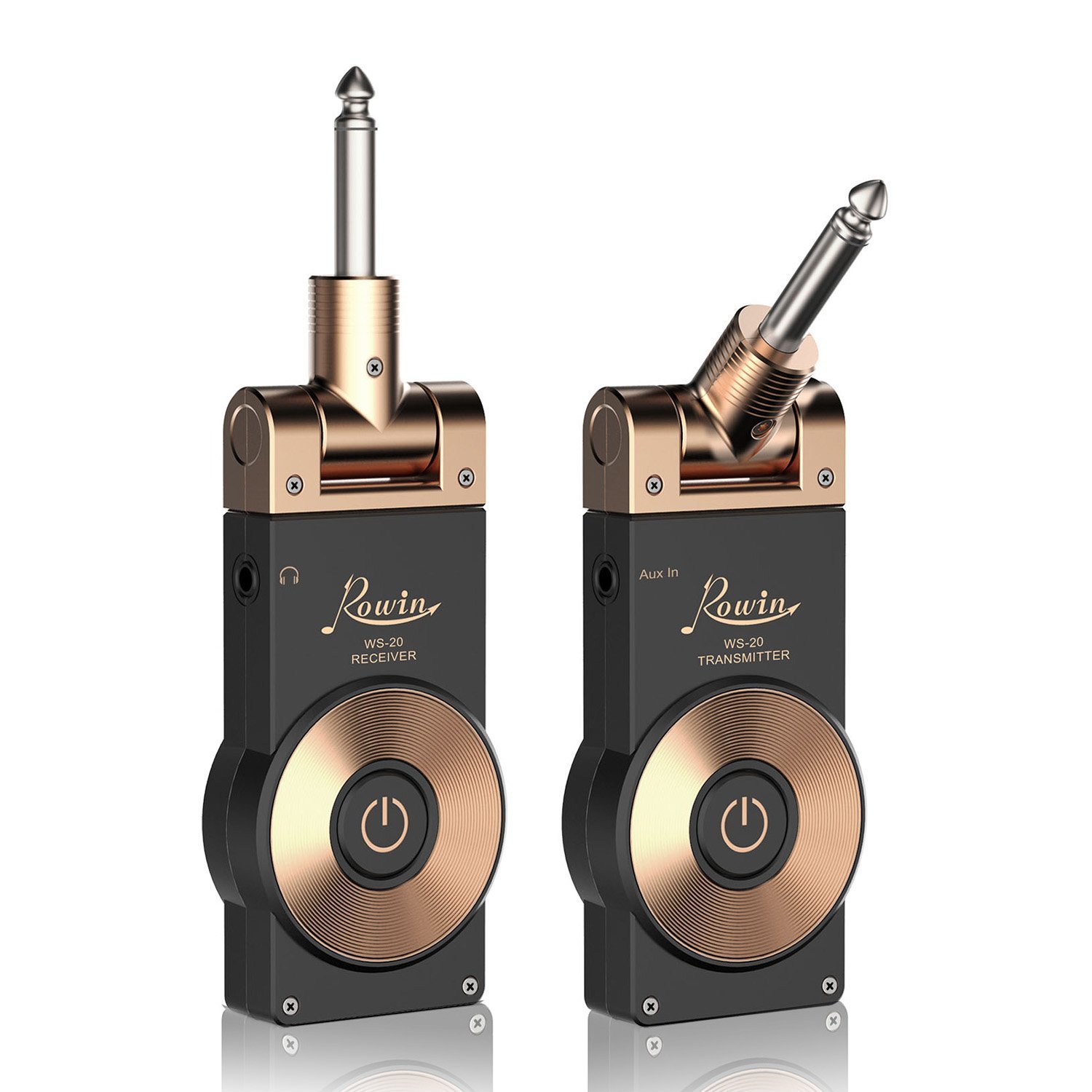
Editor's Pick
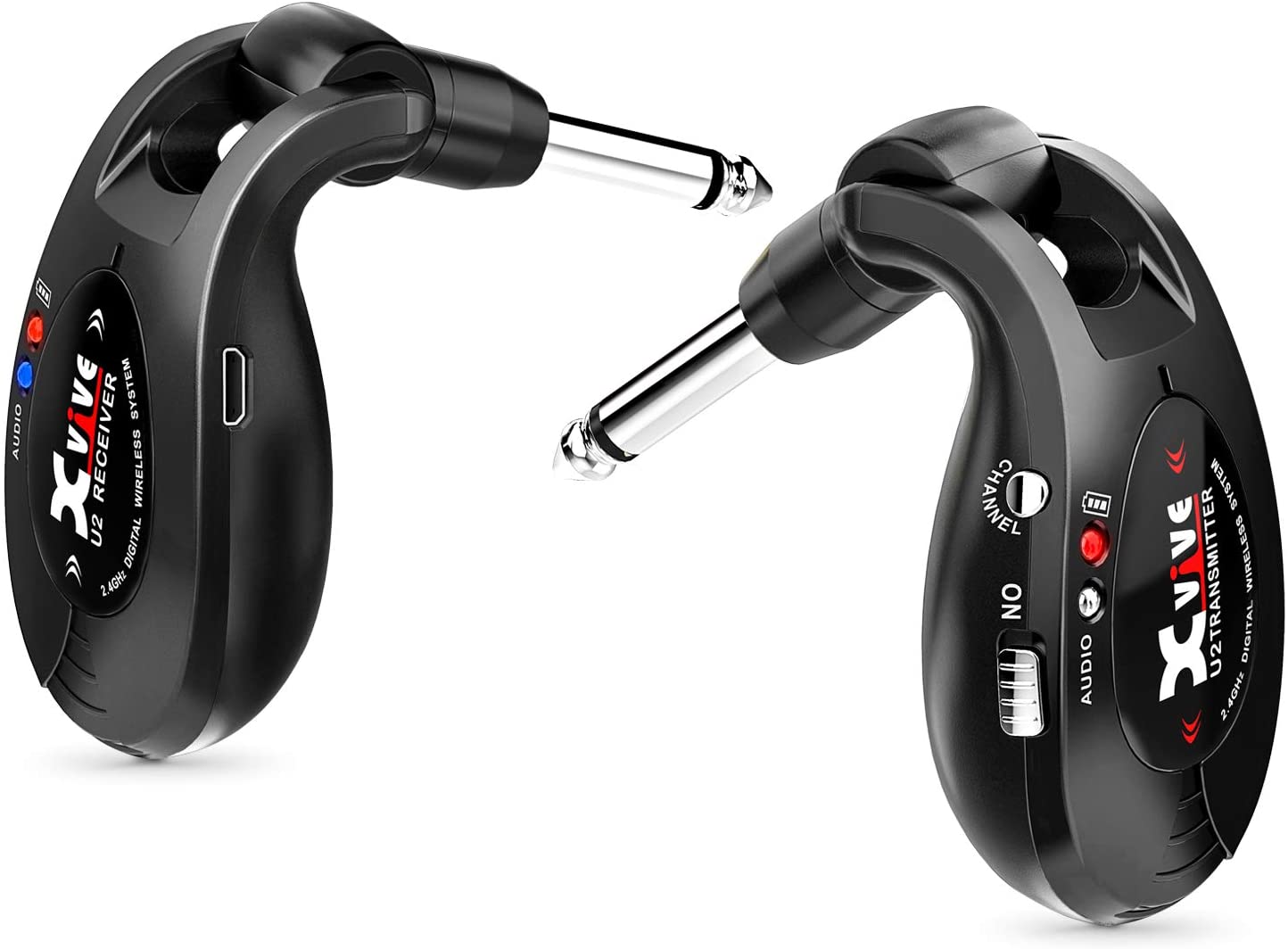
Premium Pick
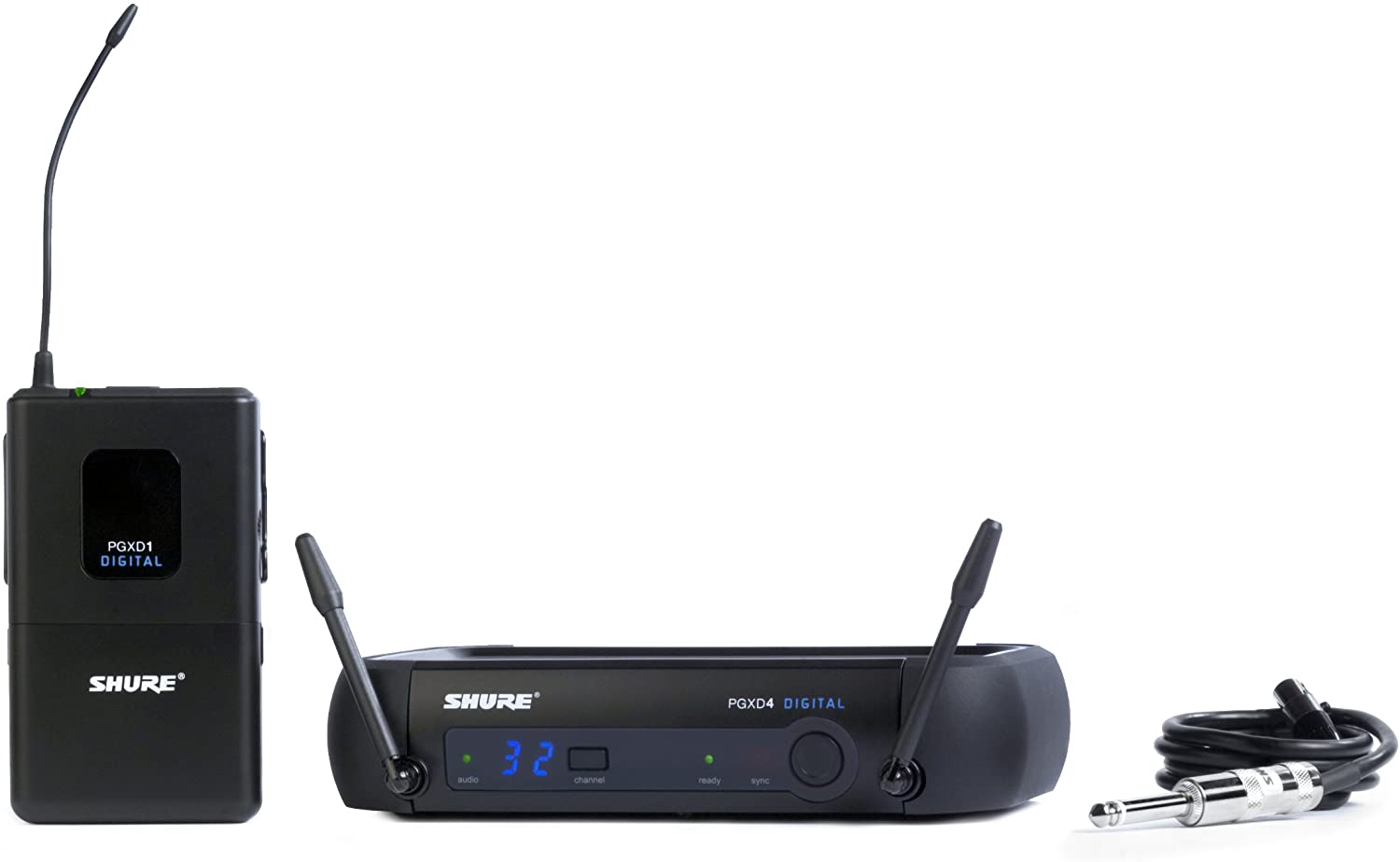
Thomas Boxtiger
Head Music Editor
Performing for a live crowd is truly an exhilarating and intoxicating experience. Playing your music while the crowd (or your friends and family!) cheers and sings along is something only a select few can truly appreciate. But those who do so know that it's important to be aware of where all those instrument, amp, and microphone wires are. The last thing you want is to trip over them and ruin your musical number. This is where wireless guitar systems come into play. You get to do away with pesky cords and truly immerse yourself in your craft, unrestricted.
1. Xvive U2 Rechargeable 2.4GHZ Digital System

This is one of the most popular and highly rated wireless guitar system currently on the market. The price tag might be a bit steep for some but you will get one of the best possible performance and sound quality in return. It requires a quick and simple setup and will be able to deliver 20Hz to 20 kHz frequency response. It has an incredibly low latency of 6ms which means you get crisp guitar tones. It has an operation signal of 100 feet and uses Lithium-ion batteries as well. The device is made of ABS plastic casing which is a durable material that can withstand its fair share of impacts.
Pros
- Extremely lightweight and compact.
- Easy to use and operate.
- Delivers crystal clear audio.
- Impressively long battery life.
Cons
- At 100 feet operation range, you need to always be aware of straying too far from the receiver.
2. Rowin 2.4GHZ Rechargeable System

The Rowin Wireless Guitar System is another noteworthy device that has become quite popular in guitar player circles. It offers 100 feet operation range with a great battery life delivering 8 hours of performance with a 4-hour (max) recharge time. It also has a batter indicator so you won’t get caught unaware when your battery is almost drained. It has active monitoring for bother earphones and aux. As for the latency, it has a good 12ms which mean audio transfer flows smoothly.
Pros
- It has a lightweight, sleek, and user-friendly design.
- Solid battery life with a fair recharge time.
- Great quality frequency response with dynamic range.
Cons
- The sound will sometimes jump when the line of sight is obstructed by equipment even within the 100-foot range.
3. Getaria Rechargeable Digital System
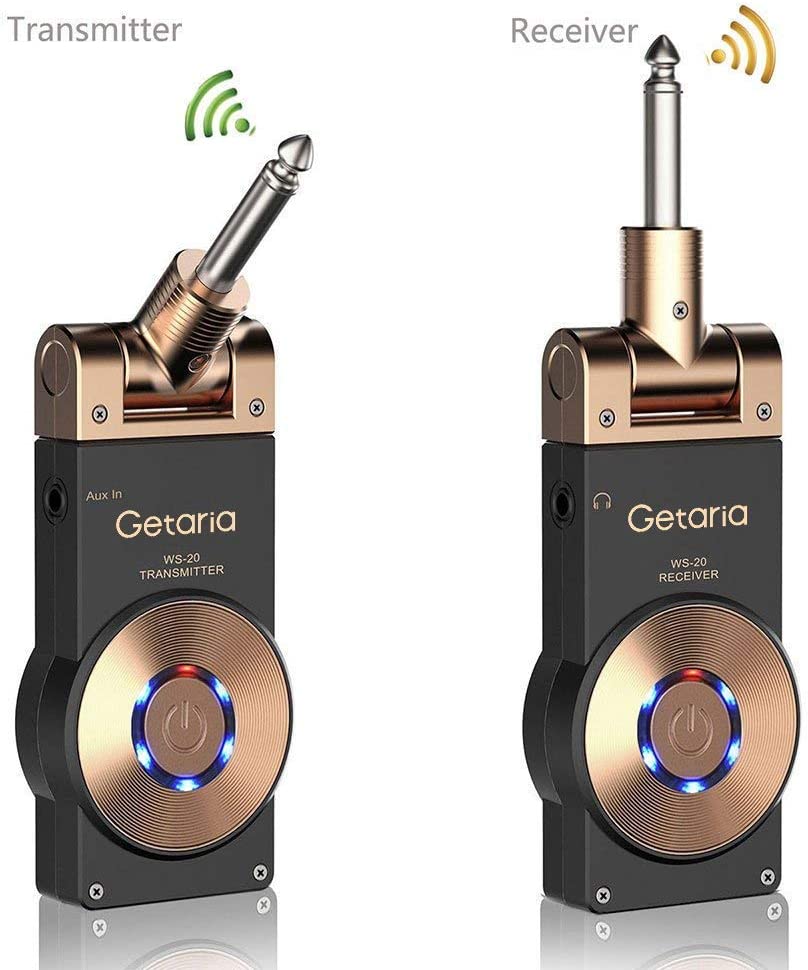
The Getaria features 2.4 GHz uncompressed wireless transmitting for optimum quality sound. It has a 100 feet operation range which is a decent enough for live performances. It uses a built-in 1100mAh lithium rechargeable battery and a USB port for charging. This wireless guitar system can support 6 devices all at the same time.
Pros
- Can be charged through a USB port which is extremely convenient.
- Will also work great with acoustics.
- Compact and lightweight design.
Cons
- Some "fluttering" issues in the audio signal from time to time.
4. Shure PGXD14

The Shure is a high-end wireless guitar system that comes complete with all the bells and whistles you can think of. It can also be used perfectly well with your bass guitar. It offers 24-bit digital audio clarity which is of no surprised considering Shure’s reputation when it comes to wireless musical devices. It offers 200 feet operation range, 10 hours of battery life, and 20HZ to the 20kHZ frequency range. This is an accurate wireless guitar system for those looking for the best possible performance in their instruments.
Pros
- Crisp and clear sound quality.
- Versatile and easy to use.
- Offers performance on par with wired systems.
Cons
- It is quite expensive.
5. Nady DKW-3 VHF
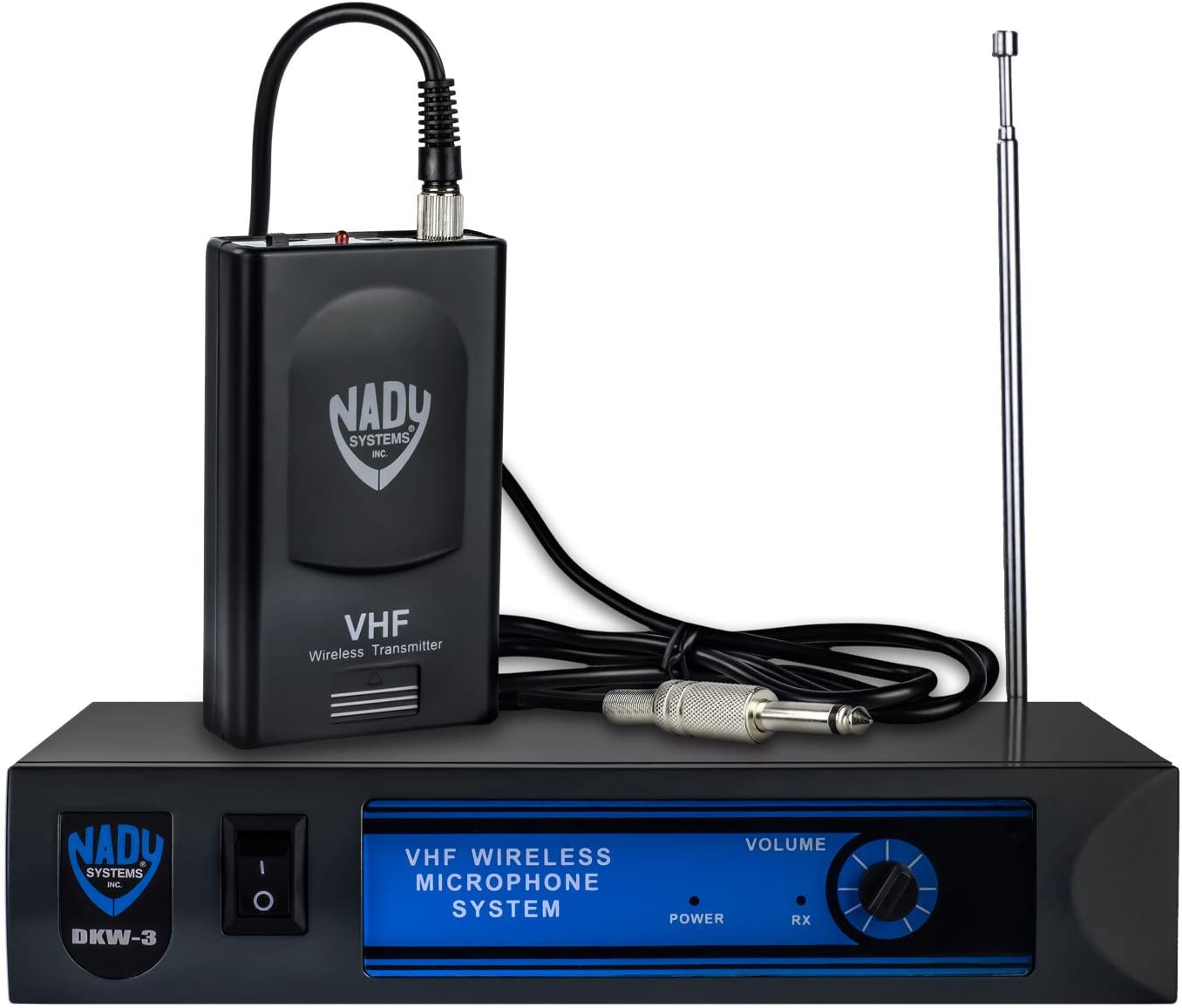
If you are looking for a cheaper alternative, then I might point you towards the Nady DKW-3 VHF Wireless Guitar System. This is an analog type wireless system and uses VHF to connect the transmitter to the receiver and amp. VHF delivers at 170 to 216MHZ and is a stable enough rating. The whole system is quick and easy to setup and has an operating range of 150 feet to 300 feet (unobstructed line of sight). This is a budget-friendly alternative but doesn’t expect it to go toe to toe with higher-end products.
Pros
- Up to 300 feet of operational range when unobstructed.
- Easy to use.
- Extremely affordable compared to other current wireless guitar systems.
Cons
- Audio quality is not that clear. This is best used during practice or for beginners.
2022 Buying Guide
Advantages
Using a wireless guitar system pretty much does away with the dangers of tripping over cords littered across the stage when performing. You get peace of mind, and the freedom to move and dance around while performing.
These wireless systems transmit electrical signals from your electric guitar to an amplifier or speaker, without the need to physically connect the two. Think of it like your standard Bluetooth headphones. Wireless guitar systems do this by using a specific radio frequency to transmit audio signals from a transmitter that's plugged into your musical instrument, directly to a nearby audio receiver that's typically plugged into your amp / speakers.
Different Types
Analog Wireless Systems
To begin, we have the analog system which transfers audio signals from the transmitter to the receiver but must first compress this signal into frequency modulation. Once it has converted the raw audio signal it will then send this frequency-modulated sound into the receiver and, subsequently, the amplifier. This is a standard procedure when it comes to analog wireless systems and is called “companding”.
The analog wireless system utilizes very high (VHF) to ultra-high frequency (UHF) bands that are similar to the ones used by most broadcast stations. VHF uses around 30 to 300 megahertz while UHF goes above 300 megahertz. The main difference between these two frequency bands is that VHF is more susceptible to signal interference and can suffer from audio degradation. I would also note that analog wireless systems need to compress and expand audio signal from a transmitter will cause a slight dip in terms of audio quality.
Digital Wireless Systems
On the other side of the spectrum, we have the digital wireless system. This is a more advanced device when it comes to its wireless capabilities. One of the biggest pluses of a digital system is its ability to skip the compression process of analog systems. It circumvents this step by simply converting the musical instrument’s audio signal into digital code and sending it directly to the receiver. It does so by using the same types of frequencies used by Wi-Fi devices.
The digital wireless system also lowers the chances of experiencing interference and nigh removing audio quality degradation from transmitter to receiver. This helps retain the sound quality of your guitar as it is produced from the amplifier, something an analog wireless system cannot guarantee.
Choosing a System
When choosing a wireless guitar system there are several factors that you need to consider. We will discuss these factors in this section which would hopefully give an idea on how to properly choose a wireless guitar system.
Frequency Agility
The first aspect of a wireless guitar system that you must look for is the frequency agility. A device’s frequency agility defines the wireless system’s ability to prevent audio interference. If you absolutely need 1:1 audio quality transmission, the frequency agility must be as high as possible. This is a crucial factor when performing in a band with numerous wireless system on stage at once. The more wireless systems are in play, the higher the chance that audio interference or intermodulation will rear its head. By having a high rating in frequency agility, you can avoid this issue completely.
Built-in Automatic Frequency Detection
Some of the wireless guitar systems on the market today even have a user-friendly feature that auto-detects the best possible frequency to use. Basically, there will be no need to worry about audio quality taking a dive during the performance of your wireless system device will be adapting on the fly to give you the best quality at all times. This is ideal if you tend to move around a lot on the stage when performing.
Battery Life
For those who will be playing their guitar for long durations of time, you should think about getting a device that utilizes lithium-ion batteries. Lithium-ion batteries are known for their longevity and should allow you hours upon hours of use before it needs to be recharged.
Operation Range
Your transmitter and receiver operational range is also something that you should consider. I highly recommend you opt for devices that offer 100 to 200 feet or more operation range. This is more than enough range to help you perform and move around the stage without affecting audio clarity. However, it is vital you make sure that there are no walls or anything that can block the line of sight between the transmitter and receiver.
Durability
When it comes to the durability of your wireless guitar system, I highly recommend you go for ones that utilize all-metal materials. This helps increase the device’s ability to withstand impacts which is a common occurrence during stage performance. Basically, if it feels flimsy, don’t get.
Nowadays, wireless guitar systems are the norm in the music industry. their benefits are undeniable in terms of performance and convenience. It has also advanced to the point where its performance is on par and even surpasses the traditional wired system from the previous generation.
Conclusion
Wireless is the industry standard and if you are still working with cords, I highly suggest that you upgrade as soon as possible. The benefits far outweigh the downsides (if any), and it's worth it for the sheer convenience alone. Hopefully, this little article helps guide you to find the best wireless guitar system for your needs!
